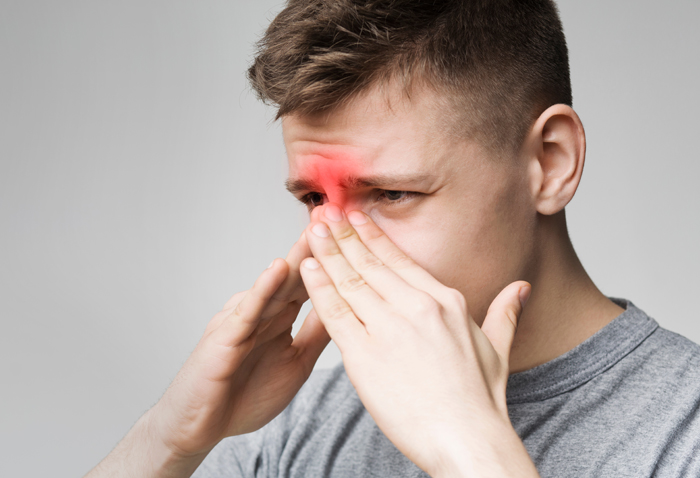Sinus Infections Treatment in Koramangala, Bangalore
Sinus is a very common infection that primarily causes the inflammation of the sinuses and the nasal passages.
Before jumping to its complexities, let us understand sinuses better. Sinuses are tiny air pockets located behind our forehead, nose, cheekbones, and in between our eyes. Their role is to produce mucus, a flowy sticky liquid that protects our body by moving germs away.
Most sinus infections are viral and go away in 10 to 15 days. But different types of sinuses can harm our bodies.

Types of Sinus
Given below are three types of sinus infections you must know about –
- Acute sinusitis – This is the mildest sinusitis that can be caused by viral or bacterial infections. This has the shortest duration (maximum 3 to 4 weeks) and can also be caused due to seasonal allergies.
- Subacute sinusitis – This type of sinusitis can last up to 3 months. Two major reasons for this are bacterial infections and seasonal allergies.
- Chronic sinusitis – As the name suggests, it lasts for the longest time, more than 3 months. The good thing about it is that it is not as severe as other diseases and is mainly caused by bacterial infections. It usually occurs with severe nasal problems and allergies.
What are the Symptoms?
The symptoms are not very significant or particular. Most of the symptoms of sinusitis coincide with those of the common cold. Here are some common symptoms –
- Fever
- Running nose
- Tiredness
- Decreased sense of smell
- Cough
- Headache
Sinus infection affects children, and it might be difficult for you as a parent to identify that. Given below are some signs you must consider as a sign of sinus infection in your children –
- Symptoms of a cold or an allergy that last for more than two weeks
- Very high fever
- A bad cough that lasts more than a week
- Very thick and dark mucus coming out of the nose
How Can We Prevent It?
Usually, a sinus infection takes full form after a cold, an allergic reaction, or flu. So the best way to prevent sinus is to lead a healthy lifestyle and limit your exposure to bacteria, germs, and viruses. Here are some preventive measures you can take to avoid a sinus infection -
- Wash your hands regularly – You go to different places and touch several objects and even people. You can get an infection from anywhere, and therefore, it is important to wash your hands at regular intervals to get rid of germs.
- Eat healthy – Eating healthy has benefits for every ailment. Eat green vegetables and fruits to develop your immunity.
- Say no to smoking – Smoking is injurious to the respiratory system, and the sinus is a part of the respiratory system.
- Avoid sitting with those who are infected – Infections spread very quickly. These infections are communicable and are easily transferred. Hence, it is important to stay away from infected people.
- Treat your cold or allergy as soon as possible - It is good to take proper medication and follow home remedies as soon as you catch a cold or allergy. This ensures it does not prolong and trouble you more. Treating these minor infections instantly will prevent sinusitis.
How Can it be Treated?
Sinusitis has different treatments, depending on the nature and severity of the infection.
- Warm cloth - In the initial stage, try dabbing a warm cloth on your face and forehead several times a day. It helps remove the congestion.
- Liquids to thin the mucus - You must drink sufficient water and other fluid so that the thick mucus loosens and eases respiration.
- Nasal sprays - You can ask your doctor to prescribe a suitable nasal spray to clear the congestion in your nose.
- Pain remedies - Sinusitis often comes with headaches and pain in the cheeks or forehead. OTC medications, such as acetaminophen and ibuprofen, help treat this type of pain.
- Antibiotics - If you do not feel well in 2-3 weeks, you must consult a doctor and start taking antibiotics as you might have a bacterial infection. You must continue your medicines regularly according to the instructions to see results.
- Surgery - Surgery is the last step if your infection does not go away with medication or time. Surgery helps in clearing the sinuses, repairing a deviated septum, or in other difficult scenarios.
Conclusion
Sinusitis is not something to be scared of as it has proven treatments. You just need to take good care of yourself and beware of nasal infections and seasonal allergies to avoid sinusitis.
One should avoid dairy products, refined sugar, chocolate, cheese, tomato, and other fruits like bananas as it can cause congestion.
Amoxicillin is used in the initial phase of sinusitis. Doctors also suggest amoxicillin-clavulanate to treat the bacterial infections of sinus.
The surgery can have some serious side effects like brain injury, heavy bleeding, meningitis, etc. But these are rare. You might have to bear pain and bleeding for two weeks after surgery.
Symptoms
Our Doctors
DR. MURALIDHAR T S
MBBS, MD (Anaesthesi...
| Experience | : | 25 Yeras Experience |
|---|---|---|
| Speciality | : | Pain Management... | Location | : | Koramangala |
| Timings | : | Available by prior a... |
DR. SHRUTI BACHALLI
MBBS, MD (Anaesthesi...
| Experience | : | 16 Yeras Experience |
|---|---|---|
| Speciality | : | Pain Management... | Location | : | Koramangala |
| Timings | : | Available by prior a... |
DR. AMIT G YELSANGIKAR
MBBS, MD (General Me...
| Experience | : | 20 Yeras Experience |
|---|---|---|
| Speciality | : | Gastroenterology... | Location | : | Koramangala |
| Timings | : | Mon, Wed, Fri : 5:30... |
DR. HARIHARA MURTHY
MBBS, MS...
| Experience | : | 26 Yeras Experience |
|---|---|---|
| Speciality | : | ENT, Head and Neck S... | Location | : | Koramangala |
| Timings | : | Mon, Wed & Thur : 3:... |
DR. KARISHMA V. PATEL
M.B.B.S, DNB...
| Experience | : | 7 Yeras Experience |
|---|---|---|
| Speciality | : | ENT, Head and Neck S... | Location | : | Koramangala |
| Timings | : | Mon, Wed, Fri : 6:00... |
DR. MANASWINI RAMACHANDRA
MS...
| Experience | : | 9 Yeras Experience |
|---|---|---|
| Speciality | : | ENT, Head and Neck S... | Location | : | Koramangala |
| Timings | : | Mon, Wed & Thur : 9:... |
DR. ROMA HAIDER
BDS...
| Experience | : | 20 Yeras Experience |
|---|---|---|
| Speciality | : | Dental and Maxillofa... | Location | : | Koramangala |
| Timings | : | Mon - Sat : 10:00 AM... |
DR. SHABBIR AHMED
MBBS, DM (Gastroente...
| Experience | : | 30 Yeras Experience |
|---|---|---|
| Speciality | : | Gastroenterology... | Location | : | Koramangala |
| Timings | : | Mon - Sat : 6:00 PM ... |
DR. J G SHARATH KUMAR
MBBS, MS (GENERAL SU...
| Experience | : | 13 Yeras Experience |
|---|---|---|
| Speciality | : | General & Laparoscop... | Location | : | Koramangala |
| Timings | : | Mon to Sat : 8:30 AM... |
DR. TUSHAR B MUNNOLI
MBBS, MD - Anaesthes...
| Experience | : | 8 Yeras Experience |
|---|---|---|
| Speciality | : | Pain Management... | Location | : | Koramangala |
| Timings | : | Wed : 11:00 AM to 2:... |
Our Top Specialities
NOTICE BOARD
CONTACT US
CONTACT US
 Book Appointment
Book Appointment












.svg)
.svg)
.svg)
.svg)








